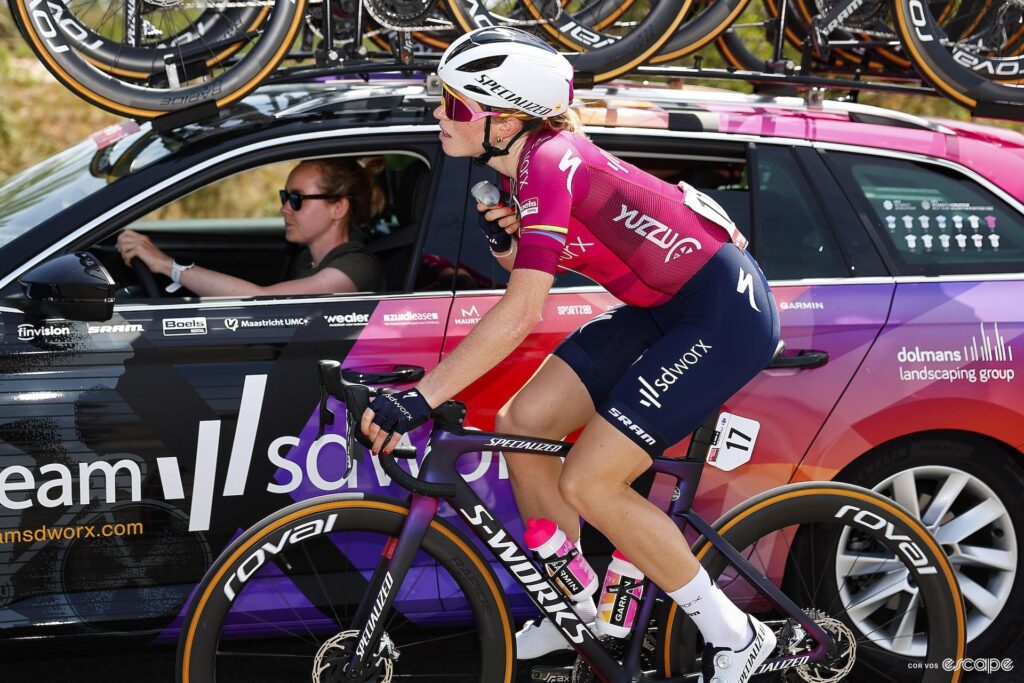In a thrilling display of endurance and strategy, Dutch cyclist Marianne Vos claimed victory in the first stage of the women’s Tour de France, marking a remarkable comeback in the prestigious race. Known for her exceptional prowess in competitive cycling, Vos executed a brilliant late attack that not only showcased her tactical acumen but also reestablished her dominance in the sport. As the excitement builds for the stages ahead, her win serves as a potent reminder of the competitive spirit driving this year’s Tour de France, where the world’s top female cyclists are set to battle for glory on the roads of France.
Vos Dominates Early Stages of Women’s Tour de France with Strategic Late Surge
In a display of unparalleled skill and tactical finesse, Marianne Vos seized victory in the opening stage of the Women’s Tour de France. Known for her strategic mind and robust athleticism, Vos executed a brilliant late surge that caught competitors off guard. As the race unfolded, she maintained a steady position within the main group, carefully monitoring her rivals while conserving energy for her decisive move. This calculated approach allowed her to navigate the twists and turns of the route, ensuring that she was in the right place at the right time.
The final kilometers proved pivotal, as Vos unleashed her formidable sprint, propelling herself ahead of the pack. This surge not only underscored her status as a seasoned cyclist but also highlighted the importance of strategic planning in competitive cycling. Key factors contributing to her success included:
- Positioning: Staying near the front throughout the race.
- Timing: Executing her attack at the optimal moment.
- Team Support: Utilizing her teammates to manage pace and protect her from wind resistance.
This stunning triumph not only enhances Vos’s legacy but also sets the stage for an exhilarating race in the stages to come.
Analysis of Vos’ Tactics Highlights Emerging Trends in Competitive Cycling
Marianne Vos’ exceptional tactics during the first stage of the women’s Tour de France have not only secured her a prominent victory but also brought to light several emerging trends in competitive cycling. Observers noted her strategic approach, which combined endurance with sharp timing to execute a decisive late attack. This maneuver exemplifies the importance of understanding terrain and competitor behavior, showcasing how riders are increasingly relying on tactical intelligence over sheer physical dominance. Vos’ ability to perceive the optimal moment to strike is a reflection of a broader shift in the sport towards a more cerebral style of racing, where mental acuity is as essential as fitness.
The landscape of women’s cycling is rapidly evolving, influenced by several noteworthy trends highlighted by Vos’ performance. Key factors include:
- Increased Team Cohesion: Effective communication and strategy within teams are becoming paramount, allowing riders to support each other seamlessly.
- Emphasis on Positioning: Riders are focusing on maintaining optimal positions throughout the race to conserve energy for late attacks.
- Adaptation to Varied Terrain: Competitors are training more strategically to handle different course profiles, enhancing their racing flexibility.
This triumphant stage not only advances Vos’ legendary status but also serves as a case study for future competitors, hinting at a more dynamic era in women’s cycling that prioritizes strategy just as much as speed.
Recommendations for Aspiring Cyclists: Learning from Vos’ Winning Approach
As demonstrated by Vos in her recent triumph, an effective race strategy is instrumental for success in competitive cycling. Aspiring cyclists should consider adopting a multi-faceted training regimen that emphasizes both endurance and speed. Key elements to focus on include:
- Interval Training: Incorporating short bursts of high-intensity efforts helps improve overall speed and power.
- Nutrition: A balanced diet rich in carbohydrates, proteins, and fats supports an athlete’s energy needs during training and competitions.
- Recovery: Prioritizing rest and recovery is essential to avoid burnout and injuries, enhancing performance in subsequent rides.
Moreover, Vos’ tactical acumen during races showcases the importance of strategic positioning and timing. Up-and-coming cyclists should practice the following strategies to emulate her approach:
| Strategy | Description |
|---|---|
| Pack Riding: | Stay close to the main group to conserve energy while remaining vigilant for opportunities to break away. |
| Race Analysis: | Study competitors’ strengths and weaknesses to time your attacks effectively. |
| Mental Toughness: | Building psychological resilience to handle pressure can determine race outcomes during critical moments. |
Closing Remarks
In conclusion, Marianne Vos’s stunning performance in the first stage of the women’s Tour de France not only underscores her remarkable talent but also elevates the excitement surrounding this prestigious event. With her late attack sealing a definitive victory, Vos has set a high standard for her competitors as the race progresses. Fans and analysts alike will be eager to see how this legendary cyclist continues to shape the competition in the days ahead. With more stages to come, the anticipation mounts for what promises to be a thrilling Tour de France that celebrates the resilience and spirit of women’s cycling.











